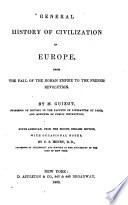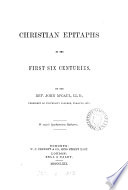 | Nathaniel Lardner - 1815 - 654 pages
...eat things strangled without any scruple, some took an unwarrantable liberty with the text, and left that particular out of their copies; that their conduct...end of the fourth century, and the beginning of the fifth, many among the Latin Christians neglected the distinction of meats, and likewise understood... | |
 | Guizot (M., François) - 1838 - 580 pages
...I say the Christian Church, and not Christianity, between which a broad distinction is to be made. At the end of the fourth century, and the beginning of the fifth, Christianity was no longer a simple belief, it was an institution — it had formed itself into... | |
 | Guizot (M., François) - 1838 - 352 pages
...I say the Christian Church, and not Christianity, between which a broad distinction is to be made. At the end of the fourth century, and the beginning of the fifth, Christianity was no longer a simple belief, it was an institution — it had formed itself into... | |
 | François Guizot, Guizot (M., François) - 1850 - 330 pages
...I say the Christian church, and not Christianity, between which a broad distinction is to be made. At the end of the fourth century, and the beginning of the fifth, Christianity was no longer a simple belief, it was an institution — it had formed itself into... | |
 | Guizot (M., François) - 1854 - 338 pages
...I say the Christian church, and not Christianity, between which a broad distinction is to be made. At the end of the fourth century, and the beginning of the fifth, Christianity was no longer a simple belief, it was an institution — it had formed itself into... | |
 | Guizot (M., François) - 1865 - 338 pages
...I say the Christian church, and not Christianity, between which a broad distinction is to be made. At the end of the fourth century, and the beginning of the fifth, Christianity was no longer a simple belief, it was an institution — it had formed itself into... | |
 | 1868 - 680 pages
...Phylacteries, which the modern Jews wear, had been used in the time of our Lord. St. Jerome (who flourished at the end of the fourth century and the beginning of the fifth, and went to Jerusalem for the purpose of acquiring a complete knowledge of the Hebrew, and also... | |
 | John McCaul - 1869 - 116 pages
...Domino Nostro Justino perpetuo (not Patre Patrise) Augusta, anno sexto, Indictione quinta== 571 AD At the end of the fourth century and the beginning of the fifth, instead of AVGG we find AAGG and AAVVGG. The letters DD • NN • — Dominis Nostris — began... | |
 | Philip Schaff - 1870 - 1070 pages
...urbes . . denegata, totae Christianorum ac fidelium mentes Dei cultibua occupentur." 4 As Chrysostom, at the end of the fourth century and the beginning of the fifth, often complains that the theatre is better attended than the church ; so down to this day the... | |
 | Charles Hodge, Lyman Hotchkiss Atwater - 1864 - 742 pages
.... . . deuegata, totae Christianorum ac fidelium mentes Dei cultibus occupentur." || As Chrysostom, at the end of the fourth century and the beginning of the fifth, often complains that the theatre is better attended than the church; so, down to this day, the... | |
| |